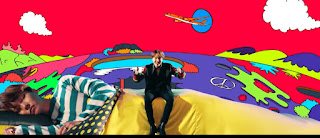“Becoming Astrid”
(original title “Unga Astrid”) is a Swedish-Danish film directed by the Danish
female director Pernille Fischer Christensen. The 123 minutes long film is
about the early years of Astrid Lindgren, the world-famous author of children’s
books such as “Pippi Longstocking”, “The Brothers Lionheart”, “Ronia, the
Robber’s Daughter”, “The Children of Noisy Village” and the “Emil of
Lönneberga” series.
The film shows
Astrid’s rebellious teenage years in the 1920’s provincial Sweden and how she
was meant to do something out of the ordinary. Rather than behave like it was
expected of a small-town young girl in Sweden back then, Astrid danced to her
own drum, cut her hair short to look fashionably androgynous, had an affair
with her thirty years older, married boss, the newspaper editor Reinhold
Blomberg (Henrik Rafaelson), and ended up pregnant at the age of nineteen. She
was then sent off to secretary school in Stockholm to hide the shame from the
neighbours and eventually travelled to Copenhagen, Denmark, for clandestine
childbirth, placing her baby boy, Lasse, in the care of a Danish foster mother
before returning to Sweden. Here Astrid had to overcome poverty and struggles to
get her son back, but when Astrid finally got him to Stockholm after three
years, Lasse (Marius Damslev) didn’t want to live with this strange young woman
who spoke a foreign language. The film ends when Astrid is on the brink of a
new relationship with her new boss, office manager Sture Lindgren (Björn
Gustafsson), years before she started writing children’s books.
The dominating lead
role as Astrid is played by twenty-five-year old Alba August, daughter of the
Danish Oscar-winning director Bille August and his Swedish wife, the
internationally acclaimed actress Pernilla August. I for one was concerned about
the reasons for picking the very pretty Alba August for this role, if it was solely
because of her famous parents as she looks nothing like the scrawny, quite
plain-looking young Astrid, but luckily Alba August has talent and she is a
convincing Astrid.
Another character
that is oddly cast too is that of Marie Stevens, the Danish widow who helped
especially Swedish girls, raising their children for them until they were able
to care for them themselves, and who became Lasse’s foster mother. The part is
played by the Danish actress Trine Dyrholm who has nothing in common with the neat
little widow Stevens of real life and I for one think that Dyrholm was cast
solely because she is one of Denmark’s most sought-after actresses.
When I saw the
film, the majority of the audience consisted of women in their fifties and
sixties as we are the ones who grew up with Astrid Lindgren’s books, but even
to an audience like that the pace of the film was a bit too slow and the film
as such too long. It was beautifully filmed, though, dwelling on the pretty
Swedish landscapes.
I’ve heard people
complain about the film ending before Astrid started writing, but I don’t mind,
as this is a film about the young Astrid. What annoys me is the artistic license
that the director and screenwriters (director Pernille Fischer Christensen wrote
the screen play with Danish screenwriter Kim Fupz Aakeson) use when they
describe Astrid’s life. Here they depict young Astrid as a loner, which she
wasn’t as she belonged to a close group of (girl) friends who had known each
other since their first day of school. This close-knit girl group is nowhere to
be found in the film. Among the girls was Anne-Marie (known as Madicken) whom
Astrid adored, even to the extend, that she modelled her main character in the “Mischievous
Meg” books on her as Meg’s Swedish name is Madicken. In “Becoming Astrid”,
however, Madicken (Sofia Karemyr) plays no part in Astrid’s life, as Astrid’s only
acquaintance seems to be her lover’s daughter Berta Blomberg (Mira Mitchell).
In real life, nothing indicates that Berta and Astrid knew each other.
The relationship between
Astrid and her family is also very oddly depicted in the film. In real life,
Astrid showered the persons she loved with adoration, and her one-year older
brother Gunnar Ericsson was such a person, but in the film, Gunnar (Willy
Ramnek Petri) is hardly there. The person whom Astrid adored the most was,
however, her father, Samuel August Ericsson, as he seemed the ideal man to her
and many of her children’s book are about his childhood, especially the books
about the children of Noisy Village. This kind of blind adoration for Samuel
August (Magnus Krepper) is not shown in the film. Here only the strictness of
Astrid’s mother, Hanna Ericsson, can be found, but in the film Hanna (Maria
Bonnevie) is so strict that it borders on cruelty.
I guess the cruel
mother and the absence of friends and strong family ties makes the Astrid of
the film a tragic heroine, but the real Astrid was much more than that as she
was a multifaceted person, loved by both family and friends. On one hand she
just wanted to have fun and do things her own way without giving a damn about
what others thought, on the other hand she experienced true tragic and sorrow early
in life due to the unwanted separation from her son. This coloured her entire
life and made her such an eminent advocate of especially neglected children
around the world. Because of this, I think that the worst mistake that the film
makes is to provide young Astrid and her little son with a happy ending that
wasn’t there in real life. By doing so the film belittles the sorrow that
played such a big part in what made the young thrill-seeking girl become the
Astrid whom we love today.
Three out of five
stars: ***









